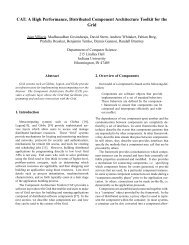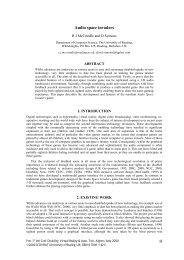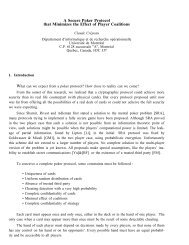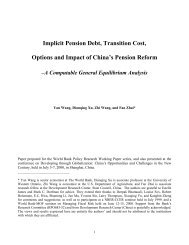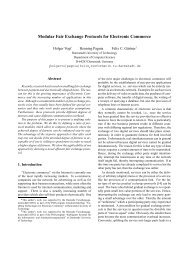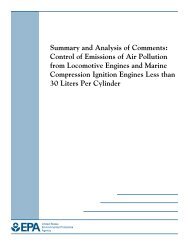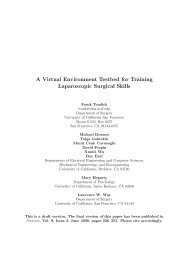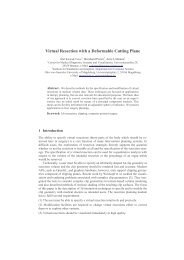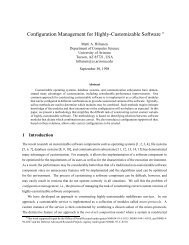Hydrology and water management in the humid tropics: proceedings ...
Hydrology and water management in the humid tropics: proceedings ...
Hydrology and water management in the humid tropics: proceedings ...
Create successful ePaper yourself
Turn your PDF publications into a flip-book with our unique Google optimized e-Paper software.
Second International Colloquium on<br />
<strong>Hydrology</strong> <strong>and</strong> Water Management <strong>in</strong> <strong>the</strong> Humid Tropics<br />
problems as though <strong>the</strong>y were concerned only with <strong>the</strong> supply of dr<strong>in</strong>k<strong>in</strong>g <strong>water</strong>. No, we<br />
must start to th<strong>in</strong>k <strong>in</strong> terms of susta<strong>in</strong>ability. A major strength <strong>in</strong> <strong>the</strong> concept of<br />
susta<strong>in</strong>ability is that it requires <strong>the</strong> enforcement of wider responsibilities for <strong>the</strong> impacts<br />
of decisions. And this <strong>in</strong>cludes scientists.<br />
Among <strong>the</strong> many important current issues that must be considered, perhaps <strong>the</strong><br />
most important one is that of urban growth <strong>and</strong> its many implications. Of <strong>the</strong> projected<br />
huge metropolitan complexes expected to exist <strong>in</strong> 2025, most by far will be <strong>in</strong><br />
develop<strong>in</strong>g countries – <strong>in</strong> <strong>the</strong> tropical countries. Many more of somewhat smaller size,<br />
<strong>and</strong> yet extremely large never<strong>the</strong>less, will also exist <strong>in</strong> <strong>the</strong> region. And it will get worse.<br />
So <strong>the</strong>re will be many, many more people to house, feed, provide with dr<strong>in</strong>k<strong>in</strong>g <strong>water</strong><br />
<strong>and</strong> waste disposal facilities, <strong>and</strong> to keep healthy. And if that forecast seems bad, th<strong>in</strong>k<br />
of this -- it is estimated that <strong>in</strong> <strong>the</strong> <strong>humid</strong> <strong>tropics</strong> more than 50 percent of <strong>the</strong> urban<br />
populations even now do not have access to <strong>water</strong> that is reasonably adequate <strong>and</strong> could<br />
be considered safe accord<strong>in</strong>g to <strong>the</strong> World Health Organization st<strong>and</strong>ards.<br />
Although sewage, if adequately treated <strong>and</strong> disposed of, poses m<strong>in</strong>imal pollution<br />
or health problems, its treatment can require heavy f<strong>in</strong>ancial <strong>in</strong>vestment. Many of <strong>the</strong><br />
cities of <strong>the</strong> <strong>tropics</strong> would clearly ra<strong>the</strong>r spend <strong>the</strong>ir limited funds on someth<strong>in</strong>g yield<strong>in</strong>g<br />
more immediate benefit, as <strong>the</strong>ir rivers <strong>and</strong> streams give ample testimony. As a result, <strong>in</strong><br />
<strong>the</strong> urban areas of Malaysia, for example, much of <strong>the</strong> population (particularly squatters<br />
<strong>and</strong> <strong>the</strong> like) has no sewer facilities at all. Panama also has a lot of improvement to do.<br />
Global warm<strong>in</strong>g, if it occurs, will cause changes <strong>in</strong> regional temperatures <strong>and</strong><br />
ra<strong>in</strong>falls, a rise <strong>in</strong> sea level, <strong>and</strong> an <strong>in</strong>crease <strong>in</strong> <strong>the</strong> severity of wea<strong>the</strong>r events. The impact<br />
of climatic change <strong>in</strong> <strong>the</strong> <strong>humid</strong> <strong>tropics</strong> could be substantial because <strong>the</strong> economies tend<br />
to be highly dependent on natural resources, which <strong>the</strong>mselves can be very sensitive to<br />
fairly moderate changes <strong>in</strong> climate.<br />
Susta<strong>in</strong>able <strong>water</strong> resource systems must be designed <strong>and</strong> operated <strong>in</strong> ways that<br />
make <strong>the</strong>m more adaptive, robust, <strong>and</strong> resilient to those uncerta<strong>in</strong> changes. The <strong>water</strong><br />
resource systems must be capable of effectively function<strong>in</strong>g under conditions of<br />
chang<strong>in</strong>g supplies, <strong>management</strong> objectives, <strong>and</strong> dem<strong>and</strong>s. And while susta<strong>in</strong>able<br />
systems, like any o<strong>the</strong>rs, may fail, if <strong>the</strong>y fail <strong>the</strong>y must be capable of recover<strong>in</strong>g <strong>and</strong><br />
operat<strong>in</strong>g properly without undue costs. New approaches, <strong>the</strong> results of scientific<br />
<strong>in</strong>quiry, become necessary.<br />
In general <strong>the</strong> concept of environmental <strong>and</strong> ecological susta<strong>in</strong>ability has resulted<br />
largely from a grow<strong>in</strong>g concern about <strong>the</strong> long-run health of our planet. But it is<br />
becom<strong>in</strong>g <strong>in</strong>creas<strong>in</strong>gly evident that <strong>the</strong> present resource use <strong>and</strong> <strong>management</strong> activities<br />
<strong>and</strong> actions, logg<strong>in</strong>g of <strong>the</strong> forests for example, will significantly affect <strong>the</strong> welfare of<br />
those liv<strong>in</strong>g with<strong>in</strong> much larger regions <strong>in</strong> <strong>the</strong> future, <strong>and</strong> particularly <strong>in</strong> those countries<br />
of <strong>the</strong> <strong>humid</strong> <strong>tropics</strong>.<br />
As a result, <strong>water</strong> resource <strong>management</strong> problems can no longer be viewed as<br />
purely technical <strong>and</strong> of <strong>in</strong>terest only to those liv<strong>in</strong>g with<strong>in</strong> <strong>the</strong> <strong>in</strong>dividual <strong>water</strong>sheds<br />
where those problems exist. Ra<strong>the</strong>r <strong>the</strong>y must be seen as be<strong>in</strong>g closely related to broader<br />
societal structures, dem<strong>and</strong>s <strong>and</strong> issues. Many so-called local <strong>water</strong> resources<br />
development <strong>and</strong> <strong>management</strong> projects will need to be viewed much more from a multidiscipl<strong>in</strong>ary<br />
<strong>and</strong> <strong>in</strong>ter-regional perspective.<br />
It is evident that if a country’s major goal is to be <strong>the</strong> <strong>in</strong>creas<strong>in</strong>g of <strong>the</strong> quality of<br />
life of its people, it <strong>the</strong>n becomes essential that <strong>the</strong>re be cont<strong>in</strong>ued scientific <strong>and</strong><br />
technological development. And this depends to a large degree on <strong>the</strong> extent of general<br />
scientific development <strong>and</strong> on <strong>the</strong> scale on which <strong>the</strong> results of research are used.<br />
While much of <strong>water</strong> resources research does not deal with technology per se– ra<strong>the</strong>r,<br />
33




